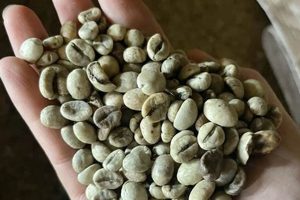The term refers to coffee beans that have not been ground and are certified to have been grown without synthetic fertilizers, pesticides, or herbicides. These beans are roasted and packaged whole, preserving their inherent oils and flavors until the moment of grinding. An example would be a bag of ethically sourced Arabica beans, certified by a recognized organic certification body and intended for home grinding.
The significance of selecting this type of coffee lies in several key aspects. The intact form retains volatile aromatic compounds, resulting in a fresher, more flavorful cup compared to pre-ground options. The organic designation guarantees a reduced environmental impact through sustainable farming practices and eliminates potential exposure to harmful chemicals. Furthermore, purchasing beans from reputable sources often supports fair trade initiatives and promotes the well-being of coffee farmers and their communities. Historically, the movement towards organic coffee cultivation has been driven by increasing consumer awareness of environmental and social responsibility.
The subsequent sections will delve into the specific roasting profiles appropriate for different bean varieties, the optimal grinding techniques to extract the fullest flavor, and the brewing methods best suited for achieving a nuanced and satisfying coffee experience.
Tips on Selecting and Preparing Coffee Beans
This section outlines several key considerations for maximizing the enjoyment and quality of coffee, starting from the selection process to the final brewing method.
Tip 1: Storage is paramount. Protect beans from exposure to air, light, heat, and moisture. An airtight, opaque container stored in a cool, dark place, away from the oven or direct sunlight, is optimal. Exposure to these elements accelerates the staling process, diminishing flavor and aroma.
Tip 2: Grind only what is needed. Grind immediately before brewing to preserve the volatile compounds that contribute to flavor. Pre-grinding allows these compounds to dissipate, resulting in a less vibrant and complex cup of coffee.
Tip 3: Invest in a quality grinder. Burr grinders produce a consistent particle size, which is crucial for even extraction. Blade grinders chop the beans unevenly, leading to over-extraction of some particles and under-extraction of others, resulting in a muddy or bitter taste.
Tip 4: Consider water quality. Use filtered water free from chlorine and other impurities. These impurities can negatively impact the taste of the coffee. Distilled water is not recommended as it lacks the minerals necessary for proper extraction.
Tip 5: Experiment with grind size. The optimal grind size varies depending on the brewing method. A coarser grind is generally suitable for French presses, while a finer grind is preferred for espresso machines. Adjust the grind size until the desired flavor profile is achieved.
Tip 6: Pay attention to water temperature. The ideal brewing temperature is between 195-205F (90-96C). Temperatures outside this range can lead to under-extraction or over-extraction, affecting the overall taste. Use a thermometer to ensure accurate temperature control.
Tip 7: Select a brewing method that suits your palate. Different brewing methods, such as pour-over, French press, or espresso, extract different flavors and produce distinct textures. Experiment to discover the brewing method that best complements the chosen beans.
By adhering to these recommendations, one can significantly enhance the coffee-drinking experience, unlocking the full potential of ethically and sustainably sourced coffee beans.
The following sections will explore common flavor profiles and suggested food pairings to further complement and enhance the coffee experience.
1. Sourcing Transparency
Sourcing transparency in the context of organic coffee beans establishes a direct link between consumers and the origins of their product. This traceability reveals the journey from cultivation to processing, ensuring adherence to organic standards. A lack of transparency obscures the methods employed, potentially masking unethical or unsustainable practices. When traceability is present, consumers can verify the farm’s compliance with organic certifications, confirming that the beans were grown without prohibited pesticides and synthetic fertilizers. This verifiability builds trust and supports the integrity of the organic label.
The importance of sourcing transparency extends beyond verifying organic practices. It also encompasses fair labor conditions and equitable economic partnerships with coffee farmers. For example, cooperatives that provide detailed information about their member farms, including their environmental initiatives and community development programs, demonstrate a commitment to ethical sourcing. Consumers, therefore, are enabled to make informed choices that align with their values, supporting businesses that prioritize social and environmental responsibility. Without this transparency, purchasing “organic” coffee risks inadvertently contributing to exploitative labor practices or environmental degradation.
In conclusion, sourcing transparency is an indispensable component of the value proposition of coffee beans. It ensures that organic certifications are genuinely upheld, empowering consumers to support ethical and sustainable agricultural practices. Addressing the challenges of verifying complex supply chains and combating fraudulent labeling is crucial for maintaining the credibility of the organic coffee industry and fostering a more equitable and sustainable coffee trade. This understanding strengthens the link between consumer values and producer practices, promoting a more responsible coffee consumption model.
2. Pesticide-Free Cultivation
Pesticide-free cultivation is a cornerstone of organic agriculture and a defining characteristic, directly impacting the quality and appeal of organic coffee beans. Its implementation has profound implications for both environmental sustainability and human health.
- Ecological Integrity
The absence of synthetic pesticides fosters a healthier ecosystem within and surrounding the coffee farms. This promotes biodiversity, supporting beneficial insects, birds, and other wildlife that contribute to natural pest control. For instance, shade-grown organic farms often exhibit greater species diversity compared to conventionally managed farms that rely on chemical inputs, leading to a more balanced and resilient agricultural system.
- Soil Health Enhancement
Pesticide-free cultivation relies on natural methods of soil management, such as composting and cover cropping. These practices improve soil structure, fertility, and water retention, reducing the need for synthetic fertilizers and enhancing the overall health of the soil. Healthy soil supports the coffee plants’ natural defenses against pests and diseases, leading to a more robust and sustainable crop. For example, the use of vermicompost enriches the soil with beneficial microorganisms, increasing nutrient availability to the plants.
- Reduced Health Risks
Eliminating synthetic pesticides minimizes the risk of exposure to harmful chemicals for farmworkers, local communities, and consumers. Pesticide residues can persist on coffee beans, potentially posing health risks during consumption. Organic certification ensures that beans are free from these residues, offering a safer and healthier product. Studies have demonstrated that chronic exposure to certain pesticides can lead to various health problems, highlighting the importance of pesticide-free cultivation.
- Enhanced Flavor Profile
Some argue that pesticide-free cultivation allows the coffee plant to develop a more complex and nuanced flavor profile. The absence of synthetic inputs encourages the plant to rely on its natural defense mechanisms and absorb nutrients from the soil in a more balanced way. This can result in beans with a richer aroma and a more distinctive taste, appreciated by coffee connoisseurs. The focus on soil health can promote the development of desirable flavor precursors within the bean.
These various facets of pesticide-free cultivation directly affect the sustainability and quality of organic coffee beans. The benefits extend beyond the cup, positively impacting the environment, the well-being of agricultural communities, and the overall sustainability of the coffee industry. Therefore, the integration of these practices aligns the product with the demand for ethically and sustainably sourced consumables.
3. Flavor Preservation
Flavor preservation is a critical element in the appreciation and value of coffee beans, directly influenced by whether the beans are sold and stored whole and whether they were cultivated under organic practices. The integrity of the bean’s volatile aromatic compounds is paramount to the final taste experience.
- Volatile Compound Retention
The whole bean format inherently protects volatile aromatic compounds, which are responsible for the coffee’s nuanced flavors and aromas. Once ground, these compounds begin to dissipate rapidly due to oxidation. Keeping the beans intact until the moment of brewing maximizes the presence of these desirable elements. For example, a freshly ground batch of whole bean coffee will release a potent aroma, indicative of the volatile compounds ready to be extracted, whereas pre-ground coffee, even when stored correctly, will exhibit a muted aroma.
- Oil Preservation
Coffee beans contain oils that contribute significantly to the body and mouthfeel of the brewed coffee. When beans are ground, these oils are exposed to air and begin to oxidize, leading to rancidity and a degradation of flavor. The whole bean format encapsulates these oils, preserving their integrity until grinding. Evidence of this can be seen in the difference in taste between freshly brewed coffee from whole beans and coffee brewed from pre-ground beans that have been stored for an extended period.
- Impact of Organic Practices
Organic cultivation practices, such as avoiding synthetic pesticides and fertilizers, can indirectly contribute to flavor preservation. Healthy soil and a thriving ecosystem encourage the development of a more complex flavor profile in the bean itself. The absence of chemical interference allows the plant to fully express its genetic potential, potentially leading to a more nuanced and flavorful coffee. The lack of synthetic inputs ensures no undesirable tastes are imparted to the beans that could overshadow the inherent flavor characteristics.
- Minimizing Staling
The degradation of coffee beans, often referred to as staling, is a process that negatively impacts flavor. Whole beans stale at a significantly slower rate compared to pre-ground coffee because the surface area exposed to oxygen is substantially reduced. The longer the beans remain whole, the longer the consumer can maintain the desired flavor profile. Staling effects can be mitigated by proper storage in airtight containers and avoiding exposure to light, heat, and moisture. These external elements accelerate degradation.
These multifaceted elements interact synergistically to influence the quality and overall satisfaction derived from consuming coffee beans. The organic certification, combined with the whole bean format, serves as a guarantee of a product where flavor preservation is a central consideration, providing consumers with a richer, more authentic coffee experience. These methods ensure the integrity of flavors, setting standards for higher quality and enjoyment.
4. Grinding Freshness
Grinding freshness, the practice of grinding coffee beans immediately before brewing, represents a pivotal factor in maximizing the flavor potential inherent in coffee beans, particularly those designated as whole bean organic. The temporal proximity between grinding and brewing directly impacts the extraction of desirable aromatic compounds.
- Aromatic Compound Release
Grinding ruptures the cellular structure of the bean, liberating volatile aromatic compounds. These compounds, responsible for the coffee’s distinct aroma and flavor, are highly susceptible to oxidation and evaporation upon exposure to air. Grinding immediately before brewing minimizes the time these compounds have to dissipate, ensuring a more pronounced and complex flavor profile in the final cup. For example, a side-by-side comparison of coffee brewed from freshly ground beans versus pre-ground beans will often reveal a significant difference in aroma intensity and overall flavor complexity, highlighting the impact of aromatic compound retention.
- Oil Oxidation Mitigation
Coffee beans contain oils that contribute to the body and mouthfeel of the brewed coffee. Grinding exposes these oils to oxygen, initiating oxidation, a process that leads to rancidity and the development of undesirable flavors. Grinding shortly before brewing minimizes the duration of oil oxidation, preserving the integrity of these flavor-contributing oils. Rancid oils can impart a stale or bitter taste to coffee, detracting from the intended flavor profile. Minimizing exposure to oxygen helps to preserve desirable flavor characteristics.
- Extraction Uniformity
Freshly ground coffee exhibits a more consistent particle size compared to pre-ground options, which can become compacted and uneven during storage. Uniform particle size ensures a more even extraction during brewing, preventing over-extraction of some particles and under-extraction of others. Uneven extraction can result in a bitter or sour-tasting cup of coffee. Grinding shortly before brewing promotes a more balanced and consistent extraction process.
- Influence on Crema Formation
In espresso preparation, grinding freshness directly influences the formation of crema, the creamy, reddish-brown foam that sits atop a well-extracted shot of espresso. Freshly ground beans release more carbon dioxide during the brewing process, contributing to a richer and more stable crema. Crema contributes to the overall taste, texture, and visual appeal of espresso. Stale beans release less carbon dioxide, resulting in a thin or absent crema.
These facets demonstrate the significant contribution of grinding freshness to the overall quality of brewed coffee. In the context of whole bean organic coffee, the practice of grinding immediately before brewing serves to unlock the full potential of the bean, maximizing the flavor expression inherent in organically grown and processed beans. The benefits are magnified because organically grown beans often have a more complex and nuanced flavor profile, making their preservation even more crucial for a premium drinking experience.
5. Sustainable Practices
Sustainable practices are inextricably linked to the production of whole bean organic coffee. Organic cultivation, by its very definition, necessitates environmentally sound and socially responsible methods. These practices are not merely add-ons, but fundamental requirements for achieving organic certification. A core principle is the elimination of synthetic pesticides, herbicides, and fertilizers, preventing soil degradation, water contamination, and harm to biodiversity. Shade-grown coffee, a common practice, preserves natural habitats and provides critical ecological services. Fair trade certifications often accompany organic certifications, guaranteeing fair wages and working conditions for farmers and their communities. This integrated approach ensures environmental stewardship and social equity.
The impact of sustainable practices extends beyond the farm level. Responsible water management, for example, is crucial in coffee processing, particularly during washing. Closed-loop systems and water recycling minimize waste and reduce the strain on local water resources. Furthermore, the focus on composting and natural soil amendments enhances carbon sequestration in the soil, mitigating climate change. Energy efficiency in roasting facilities and the use of biodegradable packaging contribute to a reduced carbon footprint throughout the supply chain. These practices collectively minimize the environmental impact of coffee production and promote a more resilient and ecologically balanced agricultural system. An example is a coffee cooperative implementing solar power for their drying and processing facilities, reducing reliance on fossil fuels and lowering greenhouse gas emissions.
In summary, sustainable practices are integral to the ethos of whole bean organic coffee. They safeguard ecosystems, promote social justice, and contribute to the long-term viability of coffee farming. The adherence to these practices is not simply a marketing strategy, but a commitment to environmental and social responsibility. By understanding and supporting sustainable coffee production, consumers contribute to a more equitable and environmentally sound coffee industry. Challenges remain in scaling up sustainable practices and ensuring transparency throughout the supply chain, but the benefits are clear: a healthier planet, thriving communities, and a flavorful cup of coffee. This integrated approach ensures the highest standards are maintained from origin to consumption.
Frequently Asked Questions
This section addresses common inquiries regarding coffee beans, aiming to clarify misconceptions and provide comprehensive information on selection, storage, and preparation.
Question 1: What distinguishes coffee beans from pre-ground coffee?
Coffee beans retain volatile aromatic compounds and oils until grinding. This preservation results in a fresher, more flavorful cup compared to pre-ground coffee, where these compounds dissipate over time. Pre-ground coffee also suffers from increased oxidation, leading to a decline in quality.
Question 2: How does organic certification influence the quality and safety of coffee beans?
Organic certification signifies adherence to strict standards prohibiting synthetic pesticides, herbicides, and fertilizers. This cultivation method reduces the risk of chemical residues and promotes biodiversity, contributing to a healthier ecosystem. The absence of synthetic inputs may also allow for a more nuanced flavor profile to develop in the bean.
Question 3: What are the key factors to consider when selecting coffee beans?
Origin, roast level, and processing method are critical considerations. Origin influences the inherent flavor characteristics, while roast level affects the intensity and balance of flavors. Processing method, such as washed or natural, imparts distinct nuances to the final product. Ethical sourcing and transparency are also important factors to ensure fair treatment of farmers and environmental sustainability.
Question 4: What is the optimal storage method for coffee beans?
Coffee beans should be stored in an airtight, opaque container in a cool, dark, and dry location. Exposure to air, light, heat, and moisture accelerates staling and degrades flavor. Avoid storing beans in the refrigerator or freezer, as condensation can damage the beans and introduce unwanted flavors.
Question 5: What type of grinder is recommended for achieving optimal results?
A burr grinder is recommended over a blade grinder. Burr grinders produce a more consistent particle size, leading to more even extraction during brewing. Blade grinders chop the beans unevenly, resulting in inconsistent extraction and potentially bitter or sour flavors.
Question 6: What water temperature is ideal for brewing coffee beans?
The ideal water temperature for brewing coffee is between 195-205 degrees Fahrenheit (90-96 degrees Celsius). Temperatures outside this range can lead to under-extraction or over-extraction, resulting in a less desirable flavor profile. Using a thermometer ensures accurate temperature control.
In summary, selecting coffee beans necessitates careful attention to origin, roast, and organic certification. Proper storage and grinding techniques are essential for preserving flavor. Optimal water temperature during brewing is critical for extracting the full potential of the bean.
The next section will address common brewing methods and their impact on the final cup of coffee.
Conclusion
The preceding sections have examined various facets of whole bean organic coffee, underscoring its significance beyond mere beverage consumption. The exploration encompassed sourcing transparency, pesticide-free cultivation, flavor preservation techniques, the importance of grinding freshness, and the integration of sustainable practices. Each element contributes to the overall value proposition, affecting environmental sustainability, consumer health, and economic equity for farmers.
Consideration of these factors promotes informed consumer choices. A commitment to the standards represented by whole bean organic coffee constitutes a decision to support responsible agricultural practices and ethical trading relationships. As consumer awareness grows, the demand for transparent and sustainable coffee production is expected to increase, driving further innovation and improvements within the industry. Continued support will benefit both producers and consumers in pursuit of a more equitable and environmentally conscious coffee market.






![Discover Freedom Roast Coffee Whole Bean: [Your Brand] Bliss Safem Fabrication - Precision Engineering & Custom Manufacturing Solutions Discover Freedom Roast Coffee Whole Bean: [Your Brand] Bliss | Safem Fabrication - Precision Engineering & Custom Manufacturing Solutions](https://deacoffee.com/wp-content/uploads/2025/06/th-1831-300x200.jpg)
